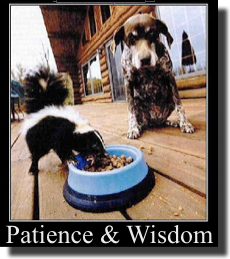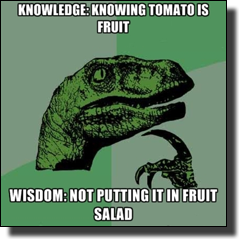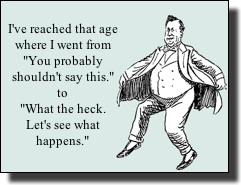 They say that with age comes wisdom. It seems as we get older we feel it is our duty to share our wisdom with everyone else. Unconvinced? Watch a Facebook conversation between a new parent and those that have already been there and done that. You can almost hear the parents with older children saying, “Bless you heart,” to the first timers.
They say that with age comes wisdom. It seems as we get older we feel it is our duty to share our wisdom with everyone else. Unconvinced? Watch a Facebook conversation between a new parent and those that have already been there and done that. You can almost hear the parents with older children saying, “Bless you heart,” to the first timers.
There is something in the human psyche that feels the need to let others know how much we know. It seems to get worse as we get older and think that the wisdom fairy has somehow blessed us. I think true wisdom comes when we realize that not everyone needs or wants our sage advice. I’ve been wrestling with this problem quite a bit lately.
I work in a job where innovation is a key element. I have been a lifelong student of creative principles and innovation practices. I think I have read every book, research paper, and psychological study on the topic. I teach classes, write a corporate blog, and basically spend most of my professional life advancing my craft. I am passionate about the subject.
 I say this not to satisfy my ego, for I have failed far more than I care to admit, but to point out that I’ve seen a lot of stuff. You can’t help but become knowledgable in a field after spending a quarter of a century practicing it. My achievement has come not from intelligence, but from remaining passionate about something for a long time. Congratulations, getting old has its benefits.
I say this not to satisfy my ego, for I have failed far more than I care to admit, but to point out that I’ve seen a lot of stuff. You can’t help but become knowledgable in a field after spending a quarter of a century practicing it. My achievement has come not from intelligence, but from remaining passionate about something for a long time. Congratulations, getting old has its benefits.
Why then, if age brings wisdom, do I still feel the childish need to let others know how much I know? Why is it when someone tells me they are going to run a brainstorming session next week, I feel compelled to tell them that research demonstrates it will likely fail? Why do I try and top someone when they bring up an older study they just read, and tell them, “I read that, and this newer study I just read is even better?” I hate hearing “I knew that” from others, so why do I still find myself uttering those defeating words to my co-workers?
Why? Because, I fear others might think I’ve spent 25 years in a field and didn’t learn a damn thing. Because, I think if others feel they are equally deep in my subject after only a few years of practice that I might be dispensable. I am older, I have to be smarter, right?
Let’s be honest, we all fear being irrelevant. Sometimes, we overcompensate. While, I think the overcompensation is human nature, that doesn’t make it acceptable.
 When I struggled to write this week’s column, I asked my wife, Beth, for some advice. She pointed out that every time I tell someone else I know something, I am losing an opportunity to learn something from them. Think about how many things we learn as parents from our kids? What if my goal in every conversation was to learn at least one thing from the other person? What if I weren’t allowed to offer someone unsolicited advice until I had first learned something from them? It sounds a bit dogmatic, but one heck of a challenge. Beth’s advice was dead on.
When I struggled to write this week’s column, I asked my wife, Beth, for some advice. She pointed out that every time I tell someone else I know something, I am losing an opportunity to learn something from them. Think about how many things we learn as parents from our kids? What if my goal in every conversation was to learn at least one thing from the other person? What if I weren’t allowed to offer someone unsolicited advice until I had first learned something from them? It sounds a bit dogmatic, but one heck of a challenge. Beth’s advice was dead on.
Wait a minute, Beth’s not a blog writer. She hasn’t spent the last 4 years of her life writing on leadership, mentoring, and self-actualization. How did she produce an answer in five minutes that I have been struggling with for years? Maybe she should be writing this column. Am I now irrelevant?
No, I am relevant today because I asked for Beth’s insight. Beth taught me that wisdom doesn’t come from the answers we have but the answers we seek. Worrying that others know how wise we are keeps us from actually becoming wise. It may not be our ego that prevents us from asking the questions, but rather our insecurities. Ironically, it is in what we know that should make us feel the most insecure.






